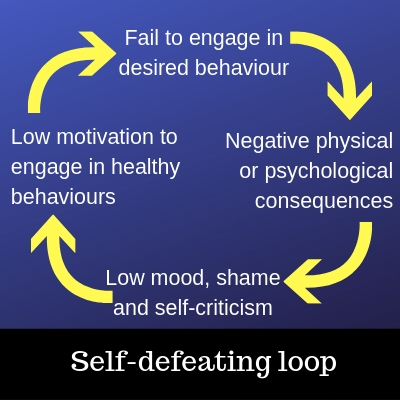
Self-discipline or self-control is being able to exert control over one’s behaviour and do this consistently and reliably over time.
It is central to being able to resist temptations and focus in on what is important and healthy.
Common examples include exercising regularly, maintaining a good diet, getting regular sleep and devoting uninterrupted time and energy to work and/or hobbies.
I’ve not talked about self-discipline specifically on this blog before, but have touched on the topic through posts on building new habits and the behaviour change expert series.
I also intend to address it as part of the Mental Fitness Course.
Self-discipline is like any skill. It needs to be practiced. Whilst some people might be naturally good at self-discipline, I find most people have to work at it to get good at it. I am definitely one of those people.
I am trying to build self-discipline in my own life in the areas of diet, exercise, meditation, practicing guitar and writing. Specifically I want to eat mostly whole foods (unprocessed), weight train at least 3 times per week, meditate and play guitar daily and write daily. Some of these are for physical health reasons (treating existing conditions), but also because I realised that life was short and I wanted to use my limited time on this planet deliberately.
That being said, I don’t find it easy and in fact, I regularly find myself lapsing on all of my self-discipline areas. The consequences are both physical and psychological. Physically, if I lapse on diet and exercise, I start feeling lethargic and ill. Psychologically, if I lapse on any of my goals, I feel guilty and weak.
This can quickly set up a self-defeating loop which looks a bit like this:

In this post I want to address a few of the challenges I’ve experienced – things that derail my attempts at self-discipline. Talking openly about them helps me address them but also helps others know that it is normal to find this stuff difficult at times.
You feel like you are pushing against more ‘natural’ tendencies
Some days it feels like my natural state should be ‘on the couch, with a cake, watching TV’. On those days, the idea of a workout followed by a nutritionally balanced meal seems like an absurd notion.
I find it interesting that I’ve been conditioned (by whatever forces) to think my natural state is ‘lazy’. When and how did that happen? The result is that I get trapped thinking that to be self-disciplined is to be constantly pushing against this natural state. It is set up psychologically as a battle of self-discipline vs laziness. This makes it additionally hard.
I suspect that we tend to mistake the need for rest, with being lazy. Significant physical or mental exertion creates fatigue. Rest is part of the recovery process so that you can get stronger and repeat that physical or mental exertion.
If your idea of self-discipline is constant uninterrupted activity, then you are denying your natural need for rest and recovery. The need for rest will exert itself as a kind of sabotage of your self-discipline efforts and you will label this as being ‘lazy’. Be careful as this label is incorrect.

The universe doesn’t really care about your attempts to be self-disciplined
When you decide to purposefully structure your life and behaviour, the universe doesn’t just magically set everything in place to make it happen. On the contrary, it will rain the day you decide to jog, a new range of chocolate will be released the day you start to diet, and the neighbour’s dog will bark the day you decide to meditate.
It is a kind of magical thinking to think the universe is consciously trying to support (or derail) your efforts to take charge of your life. The universe isn’t built on concepts of fairness or justice or reward. Those are human constructs and only applicable at the level of human behaviour (I realise others will have differing views on this, feel free to share below).
I have noticed that people who consciously take on new pursuits tend to have more opportunities present to them, but that isn’t the universe ‘rewarding’ them, that is simple probability. When you take on new activities, you are exposed to new information and new people and that creates new opportunities. It isn’t divine approval, it is mathematics.
So don’t spend time contemplating whether your personal self-discipline plan has been approved by the universe. Spend the time problem-solving all the little barriers that will get in the way of you making it a reality. They weren’t placed there deliberately, but they will be there.
We have very well-worn emotional–>behaviour pathways that are hard to break
Emotions/feelings are powerful drivers of behaviour. They developed over the course of our evolution to assist in our survival. Fear and anxiety tell us that danger is near. Happiness tells us when to approach a situation. Anger tells us when we need to fight. Sadness tells us when we need to seek the comfort of others.
We’ve learned however that emotions/feelings aren’t always the best guide. We get anxious in situations that don’t really require it or angry in situations when a fight is not the best solution. Over the course of our lives therefore we’ve pick up various habitual ways of responding or managing our emotions. For example, we might enjoy a couple of glasses of wine after a draining day. We might perk ourselves up with chocolate. We might numb ourselves by scrolling endlessly on our phones.
These emotional habits often have their roots in childhood – where we first learn how to deal with our emotions. We might learn that numbing our emotions is the best strategy, or distracting ourselves with food. These strategies then get reinforced with repeated use. By the time we are adults, we have some emotion –> behaviour pathways that are very well established.
Establishing new habits means confronting these well-worn habits. For example, to eat healthily we might have to abandon the habit of comforting ourselves with food.
This means self-discipline can be hard and emotional work. Emotions/feelings we’ve been managing through other means now present themselves to us and aren’t hugely happy we’ve taken away their normal coping strategies.
So be prepared that some self-discipline efforts will seem emotionally very challenging. We might initiate these changes with some simple, concrete goals in mind, but we may quickly learn that there is emotional baggage we need to deal with along the way.

Being self-disciplined won’t necessarily make you popular with others
I fantasise that my self-discipline efforts will inspire others and I’ll be lauded as a poster-child for self-improvement.
In reality, most people will think I am annoying. I’ll have food restrictions. I’ll say no to certain activities. I’ll prioritise other things over relationships. Being self-disciplined is not necessarily going to make me more likeable.
And let’s say I manage to strike a really good balance and still remain socially desirable. Any success I have is not necessarily going to inspire others. This is because a) people won’t really care cause they have their own shit to deal with or b) watching someone else have success when we are struggling with our own goals is not always inspirational – its annoying. People may consciously or unconsciously attempt to derail your efforts.
To be clear, I don’t think they are doing this maliciously. I don’t think they want you to fail. But I do think that your attempts to take charge of your own life might not necessarily buy you acclaim and admiration from others. Our relationships with people are complex interactions.
The takeaway message here is that any self-discipline you pursue in your own life should be for intrinsic reasons – rewards you give yourself. Any congratulations or adulation from others is simply a bonus.
Motivation and inspiration may be totally absent
Of the five things that are important to me: diet, exercise, meditation, practicing guitar and writing, I find it is only writing where I feel consistently motivated and inspired. Of the 5, it is also the one that I find the easiest to keep up with.
My motivation and inspiration for the other 4 waxes and wanes.
Does that mean that I shouldn’t be pursuing the other 4?
Not at all (although see ‘you might be doing the wrong things’ below).
Somewhere along the way, a lot of us internalise the notion that motivation and inspiration precede action. With this notion comes the expectation that the presence of motivation and inspiration will tell us what we need to do with our lives – that life will be a series of lights that turn on and guide our way. Wherever there is motivation and inspiration, that is where we should head.
It’s a lovely notion but not one I really think matches reality. Take your degree as an example. I am sure there are many days where you don’t feel motivated or inspired to do your study, but that doesn’t change the fact that a university degree is a powerful addition to your life arsenal. If you used motivation/inspiration as a guide, that degree probably wouldn’t get completed.
Your choices and your foci of self-discipline need to be selected and initiated on the basis of the best logic you can muster. I try to eat a good diet because it helps me have a healthy body, not because I am ‘inspired’ to do so.
To be clear, I am not saying that motivation and inspiration are worthless. I am just saying that their presence can be an unreliable basis on which to make behavioural choices. For me at least, inspiration and motivation haven’t shown up until I have already put in a fair bit of work. For example, it wasn’t until I built up a regular practice of weight training that I started feeling motivated to train.

You are going about it the wrong way
Sometimes the broad area of self-discipline is correct but not the way you are going about it.
I’m learning this in relation to practicing my guitar.
For a long time I’d say to myself ‘I want to play guitar more’ and then spend some time sitting by myself playing and finding it a bit ‘meh’ and then thinking ‘perhaps I don’t really want to play guitar at all’. I started to second-guess whether I was actually really interested in it anymore.
Then I found some lessons on YouTube and my interest in playing increased dramatically.
Turns out I did want to play guitar, it’s just that I wanted it to be a more connected experience, learning from or interacting with other players.
As a result, I am now looking into getting some formal lessons again.
So if you find there is an area of self-discipline where you fail repeatedly, consider the possibility that you might need to go about it another way.
A common example might be someone that wants to exercise more but picks an activity they don’t really like. For example, they take up jogging or go to gym when in fact they would much rather play a team sport.
You might be doing the wrong things
If, despite trying different angles, you fail repeatedly at a particular area of self-discipline, you might have to entertain the possibility that you’ve selected an activity that you are never going to engage in regularly.
Self-discipline is not just about picking an activity and doing it against all barriers.
Self-discipline is about picking important activities and doing them against all barriers.
It might be that you’ve picked an activity that simply isn’t that important to you. It is OK to admit that.
The good thing is, if it turns out that the activity was important to you, it will pop up again thematically in your life at a later date. You can take it up again.

Self-discipline fatigue
It is tiring to be consciously trying to select healthy activities over unhealthy ones or productive activities over passive ones. It is tiring because it consumes mental resources. It takes effort to inhibit the wrong choice and pick the ‘right’ choice. It takes effort to pick the healthy food over the quicker and more convenient unhealthy food. It takes effort to pick practicing the guitar over falling down lifeless on the couch.
The only way I’ve really been able to address this is to practice habits until they reach a level of automaticity that they no longer consume significant mental resources.
For example I intermittent fast using the 16-8 protocol. It took me 12 months and a few attempts before it became second nature. I don’t have to consciously think that much about it now. I just do it.
Eventually, with repeated practice and often a few failures along the way, a new behaviour becomes a habit. When it does, it consumes far less mental resources. For example, my guess is you rarely stress out or feel exhausted by the idea of having to brush your teeth twice a day, yet if someone asked you to start meditating 10 minutes a day (which is basically the same amount of time), you’d find it much harder.
Sometimes it just takes a significant amount of time before a behaviour becomes a habit.
Other ways to address the fatigue of self-discipline include:
- ‘cheat’ or ‘treat’ days – these are days where you relax any rules you have about things like diet or exercise
- 80% rule – accepting that you won’t be perfect and that getting to 80% on your dietary or exercise goals is adequate
- ensure that you are getting enough sleep – which is the body and mind’s time for restoration and repair
Final words
I strongly believe in self-discipline. I believe that to be good at anything requires focus and practice.
Being able to focus in on the things that are important to us and do them reliably, in the face of inevitable barriers is the basis of self-esteem and self-worth.
I also believe that it isn’t always easy. I believe that there can be many failures along the way. I experience those failures on a daily or weekly or monthly basis.
My goal in this post was to openly acknowledge some of these difficulties. In part that was therapeutic for me. I also hope it is validating for those of you who similarly experience the challenge of making and sustaining important life changes.
I will explore this topic further in the Mental Fitness Course, so stay tuned.
What sustains you when trying to overcome temptation and stick to the things that are important to you?

